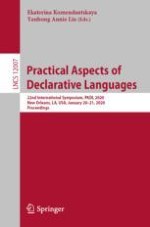2020 | OriginalPaper | Chapter
Explanations for Dynamic Programming
Authors : Martin Erwig, Prashant Kumar, Alan Fern
Published in: Practical Aspects of Declarative Languages
Publisher: Springer International Publishing
Activate our intelligent search to find suitable subject content or patents.
Select sections of text to find matching patents with Artificial Intelligence. powered by
Select sections of text to find additional relevant content using AI-assisted search. powered by

 for
for
 is required to keep the types in the multi-parameter type class unambiguous. Moreover, we can’t unfortunately simply give the generic definition for
is required to keep the types in the multi-parameter type class unambiguous. Moreover, we can’t unfortunately simply give the generic definition for
 indicated by the equation, since that would also lead to an ambiguous type.
indicated by the equation, since that would also lead to an ambiguous type.